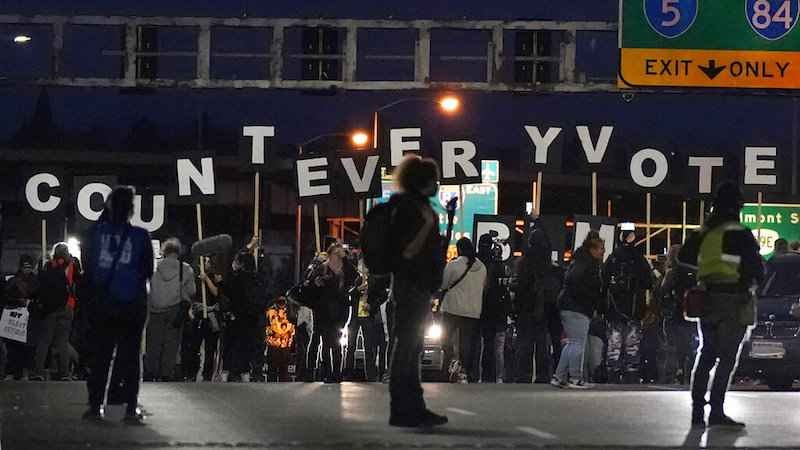End of election anxiety
Marchers hold letters up that spell out “Count Every Vote” as they make their way across an overpass in Portland, Ore., Wednesday, Nov. 4, 2020, following Tuesday’s election.
This was the first presidential election in which I was eligible to vote, and I can say with certainty that I will never forget it. Tuesday, Nov. 3 to Saturday, Nov. 6 were the most anxiety-inducing and nail biting days of my entire life.
I, like many others, became very accustomed to continuously checking the news, feeling like everything could change at any moment.
Joe Biden became the US presidential candidate to obtain the most votes ever in US history. With the virus pushing mail-in voting to an all-time high, states were swamped and it made the race even more agonizingly slow in an already historic election.
So many people’s livelihoods were riding on the ousting of Donald Trump from the Oval Office, and that tension was, and still is, felt by many minority groups across the nation.
Trump has no ground to stand on as he and his team touted, and continue to tout, the existence of widespread voter fraud.
“Multiple election officials and legal scholars said there is little Trump can do to stop the process,” the Washington Post wrote. “Even where the opportunity for a challenge exists, it rests on difference-making evidence of wrongdoing — which the Trump campaign has not presented.”
Trump’s continual barrage of nonsensical claims of voter fraud via Twitter really shines a light on the epitome of his existence as president for the last four years. He can’t stand losing or being in the wrong, and will twist the truth in any way that favors him. Some may say he’s a sore loser.
As the votes continued to roll in, and the non-swing states were confirmed red or blue, we waited on Nevada, Pennsylvania, Michigan, Wisconsin, Georgia and Arizona.
As I was refreshing the live updates from the Associated Press, I couldn’t help but feel paralyzed with a new kind of fear: the dread of living through four more years with a quasi-Fascist in the White House.
Sophomore Guilford student and psychology major Hannah Stout had a much calmer and more optimistic outlook on the election.
“I was very anxious but excited,” she said. “We desperately needed a change, and I knew that all the work and advocating and protesting we had done was reaching so many new heights. I prayed that everyone used their voice and practiced their right to vote if they could.”
She is not wrong. Marchers and protesters on both sides of the aisle were very vocal during this fraught time on something I never thought would be contested or would need avid defense in a democracy: voting.
As the New York Times reports, there were protesters last week chanting “Stop the count!” outside a Detroit vote-counting center. I, among many others, watched in shock as they continued to protest one of the pillars of our democracy.
And on the opposite side, “Count Every Vote” marches were taking place all across the country, as with the one in Portland, Oregon.
As Tuesday came to a close, we were nowhere close to finished. It felt like the beginning of a marathon you didn’t train for and didn’t know the length of before starting it.
It was a slow crawl to Saturday when Pennsylvania was called, pushing Biden over the 270 electoral votes needed to win the election. He clocked in at a landslide 284 electoral votes, and this number increased as votes continued to be counted.
Biden will claim the White House come January, and the majority of the United States got who they wanted in office. While I can’t help but see this as a victory for democracy, I also view this as a clear, numerical picture of the division of the country as we stand today.
Democracy may have won, but we still have a long way to go if we want to enact long-lasting and systematic change. We can’t go back to “normal” now; that simply isn’t good enough. This is only the beginning of a long road, so I hope you’re in for the long haul.











